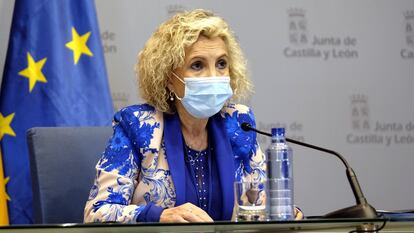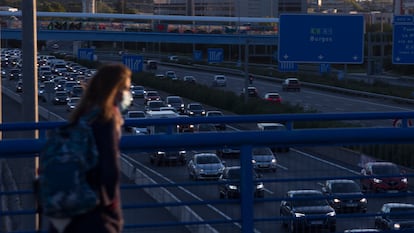Castilla y León confines two cities in the region due to rising coronavirus cases
In Madrid, meanwhile, there was normality as residents of 10 cities woke up to their first working day under the Spanish government’s new restrictions

The regional government of Castilla y León decided on Monday to confine the cities of León and Palencia given the rising number of coronavirus infections detected there over at least the last 14 days. The measure, which will come into force tomorrow, was confirmed via Twitter this morning by the regional premier, Alfonso Fernández Mañueco, as well as by the regional health chief, Verónica Casado.
The decision to confine León and Palencia will not come as a surprise to residents of the cities. Palencia had already been subject to capacity restrictions in public places given the high infection rates there. León was also on the radar of the regional government, known as the Junta, and the mayor of the city, José Antonio Díez, had been calling for restrictions on social meetings in recent days.

Both cities currently exceed the limits that were introduced last week by the central government for restrictions to be applied: the cumulative incidence of coronavirus infections over the last two weeks exceeds 500 cases per 100,000 inhabitants: the positivity rate of PCR tests exceeds 10%; and intensive care units (ICUs) in the region have an average occupation rate above 35%. The cumulative incidence of coronavirus infections has risen to 536.71 cases per 100,000 inhabitants in Palencia, and 510.45 cases in León. The regional average is 374.3 cases.
León, with 124,000 inhabitants, and Palencia, with 78,000, will be subject to a perimetral confinement, with the same measures that have been implemented in Madrid. These include closing times for establishments at 11pm with the last customer permitted to enter an hour earlier, and capacity in bars and restaurants limited to 50% indoors and 60% outside. The regional government decided to apply the restrictions – which will be in place for 14 days – to Palencia, even though the city has fewer than 100,000 inhabitants, which is one of the criteria of the Health Ministry’s new rules.
The premier of Castilla y León, Alfonso Fernández Mañueco, of the conservative Popular Party (PP), said the measures were aimed at “protecting the health” of the people in the two cities, while the mayor of León, Antonio Diez of the Socialist Party (PSOE), called on residents to act responsibly and limit social gatherings.
On Saturday, the regional government also renewed restrictions in Íscar and Pedrajas de San Esteban, which have been confined for the past two weeks after community transmission was detected in the two municipalities. Both areas exceeded the incidence threshold in August following an outbreak linked to a poultry processing plant.
According to figures released on Monday by the Castilla y León health department, the region recorded 406 new coronavirus cases, 44 of which were diagnosed in the last 24 hours, and six new deaths.
The regional premier of Castilla-La Mancha, meanwhile, is opting to wait 10 days before implementing similar restrictions to see whether the confinements that went into force in 10 Madrid cities on Friday – including the Spanish capital – have the desired effect of lowering infection rates. “Madrid has a problem and it’s greater than the rest,” Emiliano García-Page said during an interview with Spanish TV channel Antena 3. “But the problem is national,” he added, in reference to the effect that high infection rates in the Madrid region have had on neighboring regions such as his.
Restrictions in Aragón
The regional government of Aragón decided on Monday to introduce new restrictions in the cities of Zaragoza and Huesca from October 8 to 15 in a bid to reduce crowds over the Virgen del Pilar long weekend, which coincides with Spain’s National Day on October 12.
The municipality of La Almunia in Zaragoza province will be confined from Tuesday due to the rising number of coronavirus cases detected there. While the average cumulative incidence of the coronavirus in Zaragoza has remained stable at between 200 and 300 cases per 100,000 inhabitants over the past few weeks, in La Almunia, the rate is more than 1,000 cases.
Capacity at shows and cultural events will remain at 75% where preassigned seating options are available.
Normality in the Madrid region
In Madrid, residents of 10 cities woke up on Monday to their first working day under the new restrictions imposed by the central government last week, and implemented on Friday night by the regional authorities.

Under the measures, residents of the areas that have been subjected to a perimetral confinement – the Spanish capital and the surrounding cities of Alcalá, Alcobendas, Alcorcón, Fuenlabrada, Getafe, Leganés, Móstoles, Parla and Torrejón – are still permitted to travel for work reasons, among other exceptions. As such, traffic at rush hour was similar to the usual, while demand for public transportation was also at levels seen in recent weeks.
There were few police checkpoints, and anyone who is found to be breaching the rules will not, for now, be fined. Penalties are due to be enforced once the Madrid High Court rules on whether the new measures are legal. The regional government has also filed an appeal against the central government’s plans at the Audiencia Nacional, the Spanish High Court, on the basis that they encroach on their competencies. By Monday lunchtime, the High Court had rejected the urgent suspension of the measures as requested by a private individual. The court will now consider the regional government’s request for them to be suspended, albeit not urgently.
According to Madrid’s education chief, Enrique Ossorio, 1,740 classes have been suspended across the region, with 13,856 students placed under quarantine. “Only three children’s schools have been closed in the capital,” he said.
With reporting by Juan Navarro, Idoia Ugarte and Victoria Torres Benayas.
English version by Simon Hunter.
Tu suscripción se está usando en otro dispositivo
¿Quieres añadir otro usuario a tu suscripción?
Si continúas leyendo en este dispositivo, no se podrá leer en el otro.
FlechaTu suscripción se está usando en otro dispositivo y solo puedes acceder a EL PAÍS desde un dispositivo a la vez.
Si quieres compartir tu cuenta, cambia tu suscripción a la modalidad Premium, así podrás añadir otro usuario. Cada uno accederá con su propia cuenta de email, lo que os permitirá personalizar vuestra experiencia en EL PAÍS.
¿Tienes una suscripción de empresa? Accede aquí para contratar más cuentas.
En el caso de no saber quién está usando tu cuenta, te recomendamos cambiar tu contraseña aquí.
Si decides continuar compartiendo tu cuenta, este mensaje se mostrará en tu dispositivo y en el de la otra persona que está usando tu cuenta de forma indefinida, afectando a tu experiencia de lectura. Puedes consultar aquí los términos y condiciones de la suscripción digital.









































